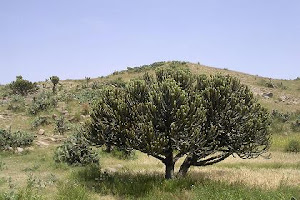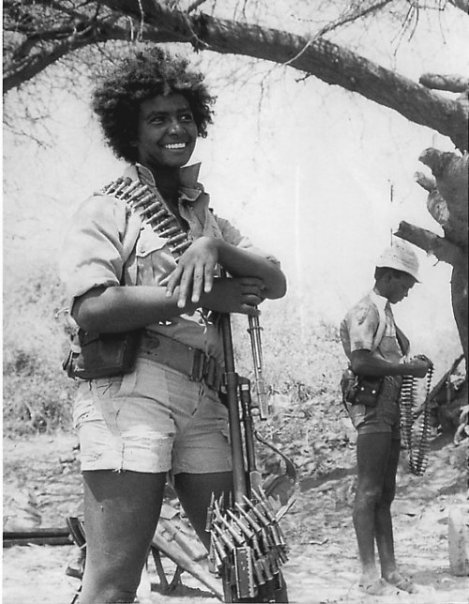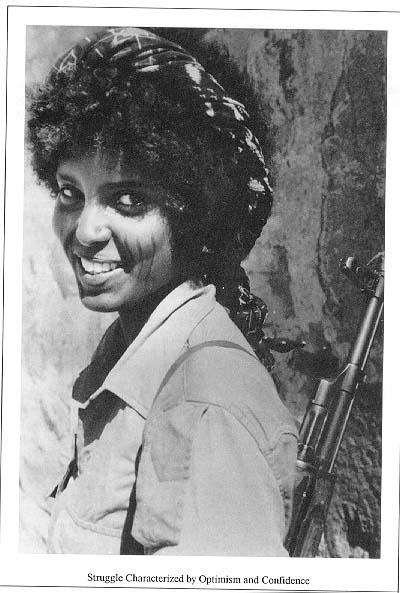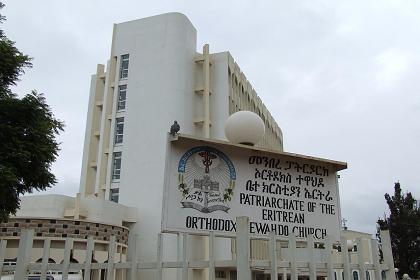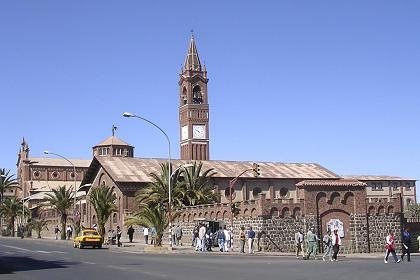Wednesday, May 23, 2007
Monday, May 21, 2007
Response from International community
The response of the International community in the words of the then U.S secretary of State, John Foster Dulles, in 1952 to a Security Council debate:
“from the point of justice, the opinion of the Eritrean people should get consideration. Nevertheless, the strategic interest of the United States in the Red Sea basin and considerations of security and world peace maker it is necessary that the country has to be linked with our ally Ethiopia.”
Sunday, May 20, 2007
Saturday, May 19, 2007
Friday, May 18, 2007
A scholar is Never Respected in His Home

"LiQ A'b Adu Aykebrn- a scholar is never respected at his home country!" is an old Eritrean saying! a true but unfortunate true! And especially at this age where civilization was based on knowlge and countries are investing millions in educating their citizens or attracting other countries scholars. Unfortunately, Eritrea is unwelcoming to its scholars! One example of this is Ambassador Haile Menkeryos, who was refuted by his government but shining in the world. Here is his latest success. Congratulations!! Amabasador Haile. We are proud of you.
SECRETARY-GENERAL APPOINTS HAILE MENKERIOS OF ERITREA
AS ASSISTANT SECRETARY-GENERAL FOR POLITICAL AFFAIRS
United Nations Secretary-General Ban Ki-moon today announced the appointment of Haile Menkerios of Eritrea as the new Assistant Secretary-General for Political Affairs, succeeding Tuliameni Kalomoh. Mr. Menkerios is currently the Deputy Special Representative of the Secretary-General for the Democratic Republic of the Congo. Previously, from June 2003 to June 2005, Mr. Menkerios was Director of the Africa I Division in the Department of Political Affairs.
In 2002, Mr. Menkerios was Senior Adviser to the Special Envoy of the Secretary-General to the Inter-Congolese Dialogue, Moustapha Niasse, and assisted the Special Envoy on all aspects of the mediation process prior to the signing of the Global and All-Inclusive Agreement on 17 December 2002 in Sun City, South Africa. From 1991 to 2000, Mr. Menkerios represented the Eritrean Government in various capacities, including as Ambassador to Ethiopia and the Organisation of African Unity, Special Envoy to Somalia and also the Great Lakes region, and Permanent Representative to the United Nations.
Mr. Menkerios has a master’s degree from Harvard University and a bachelor’s degree from Brandeis University in the United States. He was born on 1 October 1946.
Monday, May 7, 2007
Do Doctors move their eye glasses very often?
I just finished watching a tigrigna move- Mantay Skay. If you get it, I would recommend you watching it........it is one of the good Tigrigna films that I saw.
But some side question. In the film and in other tigrigna filsm, the doctors move their eyeglasses very often. Do our doctors do that in actual life?
But some side question. In the film and in other tigrigna filsm, the doctors move their eyeglasses very often. Do our doctors do that in actual life?
Saturday, May 5, 2007
Dynamics of Current Situation in the Horn of Africa
In recent weeks, the Somalia capital Mogadishu has witnessed its worst violence in 16 years, as Ethiopia and its allies accuse Eritrea of backing the dissidents, a charge Asmara denies. The events in Somalia, however, are only part of the complex geopolitics of the horn of Africa, and are becoming increasingly linked to the power game in Southern Sudan and Darfur, as DEAN DIYANI reports.
On April 23, in Baidoa, a senior US State Department official singled Eritrea for frustrating peace in Somalia by arming and training Islamists there.
But on the same day, Eritrean President Isaias Aferwerki's plane touched down in the Southern Sudan capital town, Juba. Aferwerki's visit was a part of efforts to broker peace in the troubled Darfur region in eastern Sudan and build confidence between Sudan's south and north.
The multitude of people lining long Juba's main, and only tarmacked road, probably didn't know the guest, let alone spell his name right. Emma Lobor, 12, a student at St Kizito Primary School, braved the early morning sun. However, he shook his head when asked if he knew the guest for whom he was singing. And at the airport, a billboard posted on wooden poles read, "H.E. Isaiah Aforg (sic), you are cordially welcomed to the land of peace."
Aferwerki's visit to Sudan puts him and his country right at the centre of two of Africa's most devastating conflicts, both in which the tiny African country with 4.9 million people has been deeply mired - Darfur and Somalia.
In Darfur, peace efforts have taken a multilateral approach, and with Sudan caving in to a hybrid UN/AU peace force, light is beginning to appear at the end of the tunnel. In Somalia, the peace efforts have been unilateral, and the country sinks ever deeper into chaos.
Build momentum
Aferwerki's visit to Southern Sudan, coming only a week after South African President Thabo Mbeki's visit, is the latest in a series of planned presidential calls that Southern Sudan President Salva Kiir hopes would build momentum for a regional solution for Darfur, and consensus for a way forward on the troubled implementation of the Comprehensive Peace Agreement.
Kiir established a seven-man SPLM Task Force on Darfur on March 31, appointing as its chairperson the SPLM special envoy on Darfur Rev Clement Janda, who for five months was involved in the Darfur peace talks held in Abuja, Nigeria, in 2006.
Mbeki arrived in Juba less than two weeks later and, after meeting Sudanese President Omar al Bashir, announced that the only sticking issue before Khartoum allowed in a UN force was whether or not it would use helicopters.
By inviting Mbeki first, the SPLM Darfur Task force has displayed acute understanding of diplomacy. South Africa's position as Africa's powerhouse cannot be sneered at, meaning its nod could easily have the other countries following suit.
Important also is the invitation of Aferwerki, a man deeply involved in the Darfur and Eastern Sudan conflict, and one who can easily bear down on the regime in Khartoum and the rebel groups in Darfur.
Not surprisingly, with those two visits alone Kiir's Press Secretary Ayom Wol put out a celebratory cry, declaring that the Darfur task force was "gaining momentum."
The Eritrean president may not have received the same hospitality had he instead visited Uganda, where only last month, he snubbed President Museveni when the latter visited Eritrea on a Somalia mission.
Or indeed from one of the regional countries that form the Inter-Governmental Authority on Development that Eritrea just walked out of, after accusing them of backing Ethiopia in Somalia.
But in the Sudan, Eritrea has in the past backed rebel groups in the south, including the SPLA, and in Darfur.
And even if the ordinary people didn't know Aferwerki, signs were written all over Juba that Aferwerki's support was appreciated by the political class.
"The Women League of the SPLM thanks H.E. Aferwki (sic) for his support to the SPLM," read a banner, reflecting the backing Eritrea gave the SPLM during its war against the Islamist regime in Khartoum.
Aferwerki's influence in Africa's largest country is apparently also understood by the National Congress Party in Khartoum.
At a November mini-summit on Sudan in Libya, Aferwerki was urged to mediate in the Darfur conflict and its spillover into Chad and the Central African Republic.
Eritrea mediated a peace agreement between Sudan and eastern rebels in October 2006, and observers reckon that Eritrea's success in that peace deal was because of its influence on the rebels.
On the other hand, the Somalia peace plan has taken a different turn.
"The regional powers were sidelined," says a new briefing paper from Chatham House," and multilateral efforts to support Somalia are undermined by the strategic concerns of other international actors - notably Ethiopia and the United States."
Ethiopia feared the destabilisation from insurgents based in Somalia; the US worried that al-Qaeda cells are incubating within the horn of Africa country.
Unilateralism, according to the authors of the report, has made Somalia more amenable to al-Qaeda than when it was under the routed Islamic Courts Union.
"Whatever the short-term future holds, the complex social forces behind the rise of the Islamic Courts will not go away," the briefing says.
Darfur and Somalia have also been different in how the peacekeeping forces were crafted together.
While the AU led the search for peacekeeping forces in Darfur, in Somalia such efforts were started by Ethiopia. Following the defeat of the Islamic Courts Union, Zenawi visited Ugandan President Museveni and soon Ugandan peace keepers were in Somalia. In the ensuing excitement, the US sent emissaries and US generals to visit Museveni.
Analysts believe that there were two fallouts from this.
One is a failure to read the geopolitics of the region. By feting Museveni, whitewashing him from his other controversial adventures in DR Congo and dressing him up as a powerbroker of sorts on the continent, the US rubbed the continent's real powerhouses - Nigeria and South Africa- the wrong way.
Second, was a failure to understand the social dynamics of the Horn of Africa. For instance, Museveni told IRIN that, "We are black people, this is a black continent - our continent. You cannot bring that Middle Eastern nonsense here."
Such statements do little to win over hearts for a peace keeper. If anything, they exposed Uganda's lack of understanding of the region. Masses of people in north, and northeastern Africa have for decades considered themselves Middle-Eastern, or Arab.
Also, in Somalia, unlike in Darfur, there was a failure to take into account the fears of Somalia's neighbours.
"We have always been at war," Nesredin Abdulrahman, an Eritrean state journalist attached to Aferwerki's press team told this correspondent in Juba during his president's visit. It's little wonder that Museveni's visit to Eritrea was a diplomatic failure. Aferwerki's office issued a statement moments after Museveni left saying the Eritrean President had told Museveni to immediately withdraw from Somalia.
According to a Ugandan source, Museveni's presidential jet flying from Addis Ababa, Ethiopia, was denied permission to land in the Eritrean capital Asmara, with Eritrea saying it was flying from a country with which it was at war. Museveni had to fly to the U.A.E, before landing in Asmara.
It's easy to see why Eritrea considers itself to be at war.
After all, the border dispute that resulted into a war with Ethiopia is yet to be resolved.
In retrospect, the world seems to be coming to grips with the failure to look at Ethiopia's entry in Somalia from Eritrea's view point. US Assistant Secretary Frazier, while in Baidoa, admitted that communication with Eritrea has been minimal.
"Very clearly Eritrea has opposed Ethiopia everywhere in the region," Frazier said, according to VOA. "And that probably fundamentally goes back to addressing the issue of the border. I do not believe that Eritrea has taken a position of supporting extremists as a sort of ideological orientation, or a common interest with extremist elements across the region. I think that they are also supporting rebels in Darfur for the same reason."
In other words Frazier is admitting diplomatic failure in Somalia.
Aferwerki appears willing to work under a multilateral arrangement over Somalia as he's doing in Darfur, but only after Ethiopia withdraws from Somalia.
Asked by this correspondent how he expected to build multilateral efforts to resolve the Darfur conflict, yet his country had just walked out of the seven-member IGAD, Aferwerki said Eritrea stood on the side of the people of Southern Sudan the same way it does the people of Somalia because they "want to see justice done here."
'If a nation is weakened, invaded, the civilians are tortured, we can't condone such efforts", Aferwerki said. "In regard to what's happening in Somalia, we need to say 'No' to injustice."
Aferwerki has dug in.
And he probably knows that "naughty" stories are written about his country: He has banned political parties, curtailed the creativity of his people by limiting their economic freedom through putting major enterprises under state control, and fought independent media, while also arming Islamists.
But on this sunny morning in Juba, when schools were closed and pupils told to stay home or go line the roads to welcome a president they didn't know, Aferwerki was feted.
His plane landed at Juba Airport at 11 am to the shoving and jostling among journalists for the best position for the right picture.
Aferweki wore sandals, and trademark Maoist suit.
He stepped off the plane at 11.05 am, inspected a guard of honour alongside Kiir, before a lady placed black gowns and a silk ribbon, the president's names sown into them, around the president's necks.
"Long Live, long live the president of Eritrea", the dance troupes sang. "Welcome, welcome to Southern Sudan; welcome the president of Eritrea."
Salva Kiir smiled.
Aferwerki clapped.
This is an article written by Dean Diyani on the National Media Group and All Africa.com. I found it interesting and I hope you will too.
On April 23, in Baidoa, a senior US State Department official singled Eritrea for frustrating peace in Somalia by arming and training Islamists there.
But on the same day, Eritrean President Isaias Aferwerki's plane touched down in the Southern Sudan capital town, Juba. Aferwerki's visit was a part of efforts to broker peace in the troubled Darfur region in eastern Sudan and build confidence between Sudan's south and north.
The multitude of people lining long Juba's main, and only tarmacked road, probably didn't know the guest, let alone spell his name right. Emma Lobor, 12, a student at St Kizito Primary School, braved the early morning sun. However, he shook his head when asked if he knew the guest for whom he was singing. And at the airport, a billboard posted on wooden poles read, "H.E. Isaiah Aforg (sic), you are cordially welcomed to the land of peace."
Aferwerki's visit to Sudan puts him and his country right at the centre of two of Africa's most devastating conflicts, both in which the tiny African country with 4.9 million people has been deeply mired - Darfur and Somalia.
In Darfur, peace efforts have taken a multilateral approach, and with Sudan caving in to a hybrid UN/AU peace force, light is beginning to appear at the end of the tunnel. In Somalia, the peace efforts have been unilateral, and the country sinks ever deeper into chaos.
Build momentum
Aferwerki's visit to Southern Sudan, coming only a week after South African President Thabo Mbeki's visit, is the latest in a series of planned presidential calls that Southern Sudan President Salva Kiir hopes would build momentum for a regional solution for Darfur, and consensus for a way forward on the troubled implementation of the Comprehensive Peace Agreement.
Kiir established a seven-man SPLM Task Force on Darfur on March 31, appointing as its chairperson the SPLM special envoy on Darfur Rev Clement Janda, who for five months was involved in the Darfur peace talks held in Abuja, Nigeria, in 2006.
Mbeki arrived in Juba less than two weeks later and, after meeting Sudanese President Omar al Bashir, announced that the only sticking issue before Khartoum allowed in a UN force was whether or not it would use helicopters.
By inviting Mbeki first, the SPLM Darfur Task force has displayed acute understanding of diplomacy. South Africa's position as Africa's powerhouse cannot be sneered at, meaning its nod could easily have the other countries following suit.
Important also is the invitation of Aferwerki, a man deeply involved in the Darfur and Eastern Sudan conflict, and one who can easily bear down on the regime in Khartoum and the rebel groups in Darfur.
Not surprisingly, with those two visits alone Kiir's Press Secretary Ayom Wol put out a celebratory cry, declaring that the Darfur task force was "gaining momentum."
The Eritrean president may not have received the same hospitality had he instead visited Uganda, where only last month, he snubbed President Museveni when the latter visited Eritrea on a Somalia mission.
Or indeed from one of the regional countries that form the Inter-Governmental Authority on Development that Eritrea just walked out of, after accusing them of backing Ethiopia in Somalia.
But in the Sudan, Eritrea has in the past backed rebel groups in the south, including the SPLA, and in Darfur.
And even if the ordinary people didn't know Aferwerki, signs were written all over Juba that Aferwerki's support was appreciated by the political class.
"The Women League of the SPLM thanks H.E. Aferwki (sic) for his support to the SPLM," read a banner, reflecting the backing Eritrea gave the SPLM during its war against the Islamist regime in Khartoum.
Aferwerki's influence in Africa's largest country is apparently also understood by the National Congress Party in Khartoum.
At a November mini-summit on Sudan in Libya, Aferwerki was urged to mediate in the Darfur conflict and its spillover into Chad and the Central African Republic.
Eritrea mediated a peace agreement between Sudan and eastern rebels in October 2006, and observers reckon that Eritrea's success in that peace deal was because of its influence on the rebels.
On the other hand, the Somalia peace plan has taken a different turn.
"The regional powers were sidelined," says a new briefing paper from Chatham House," and multilateral efforts to support Somalia are undermined by the strategic concerns of other international actors - notably Ethiopia and the United States."
Ethiopia feared the destabilisation from insurgents based in Somalia; the US worried that al-Qaeda cells are incubating within the horn of Africa country.
Unilateralism, according to the authors of the report, has made Somalia more amenable to al-Qaeda than when it was under the routed Islamic Courts Union.
"Whatever the short-term future holds, the complex social forces behind the rise of the Islamic Courts will not go away," the briefing says.
Darfur and Somalia have also been different in how the peacekeeping forces were crafted together.
While the AU led the search for peacekeeping forces in Darfur, in Somalia such efforts were started by Ethiopia. Following the defeat of the Islamic Courts Union, Zenawi visited Ugandan President Museveni and soon Ugandan peace keepers were in Somalia. In the ensuing excitement, the US sent emissaries and US generals to visit Museveni.
Analysts believe that there were two fallouts from this.
One is a failure to read the geopolitics of the region. By feting Museveni, whitewashing him from his other controversial adventures in DR Congo and dressing him up as a powerbroker of sorts on the continent, the US rubbed the continent's real powerhouses - Nigeria and South Africa- the wrong way.
Second, was a failure to understand the social dynamics of the Horn of Africa. For instance, Museveni told IRIN that, "We are black people, this is a black continent - our continent. You cannot bring that Middle Eastern nonsense here."
Such statements do little to win over hearts for a peace keeper. If anything, they exposed Uganda's lack of understanding of the region. Masses of people in north, and northeastern Africa have for decades considered themselves Middle-Eastern, or Arab.
Also, in Somalia, unlike in Darfur, there was a failure to take into account the fears of Somalia's neighbours.
"We have always been at war," Nesredin Abdulrahman, an Eritrean state journalist attached to Aferwerki's press team told this correspondent in Juba during his president's visit. It's little wonder that Museveni's visit to Eritrea was a diplomatic failure. Aferwerki's office issued a statement moments after Museveni left saying the Eritrean President had told Museveni to immediately withdraw from Somalia.
According to a Ugandan source, Museveni's presidential jet flying from Addis Ababa, Ethiopia, was denied permission to land in the Eritrean capital Asmara, with Eritrea saying it was flying from a country with which it was at war. Museveni had to fly to the U.A.E, before landing in Asmara.
It's easy to see why Eritrea considers itself to be at war.
After all, the border dispute that resulted into a war with Ethiopia is yet to be resolved.
In retrospect, the world seems to be coming to grips with the failure to look at Ethiopia's entry in Somalia from Eritrea's view point. US Assistant Secretary Frazier, while in Baidoa, admitted that communication with Eritrea has been minimal.
"Very clearly Eritrea has opposed Ethiopia everywhere in the region," Frazier said, according to VOA. "And that probably fundamentally goes back to addressing the issue of the border. I do not believe that Eritrea has taken a position of supporting extremists as a sort of ideological orientation, or a common interest with extremist elements across the region. I think that they are also supporting rebels in Darfur for the same reason."
In other words Frazier is admitting diplomatic failure in Somalia.
Aferwerki appears willing to work under a multilateral arrangement over Somalia as he's doing in Darfur, but only after Ethiopia withdraws from Somalia.
Asked by this correspondent how he expected to build multilateral efforts to resolve the Darfur conflict, yet his country had just walked out of the seven-member IGAD, Aferwerki said Eritrea stood on the side of the people of Southern Sudan the same way it does the people of Somalia because they "want to see justice done here."
'If a nation is weakened, invaded, the civilians are tortured, we can't condone such efforts", Aferwerki said. "In regard to what's happening in Somalia, we need to say 'No' to injustice."
Aferwerki has dug in.
And he probably knows that "naughty" stories are written about his country: He has banned political parties, curtailed the creativity of his people by limiting their economic freedom through putting major enterprises under state control, and fought independent media, while also arming Islamists.
But on this sunny morning in Juba, when schools were closed and pupils told to stay home or go line the roads to welcome a president they didn't know, Aferwerki was feted.
His plane landed at Juba Airport at 11 am to the shoving and jostling among journalists for the best position for the right picture.
Aferweki wore sandals, and trademark Maoist suit.
He stepped off the plane at 11.05 am, inspected a guard of honour alongside Kiir, before a lady placed black gowns and a silk ribbon, the president's names sown into them, around the president's necks.
"Long Live, long live the president of Eritrea", the dance troupes sang. "Welcome, welcome to Southern Sudan; welcome the president of Eritrea."
Salva Kiir smiled.
Aferwerki clapped.
This is an article written by Dean Diyani on the National Media Group and All Africa.com. I found it interesting and I hope you will too.
Subscribe to:
Comments (Atom)



























